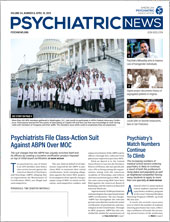On the third day of another record-breaking heat wave, my patient, a 21-year-old woman with schizophrenia, presents to the emergency room with an exacerbation of chronic asthma: cough, wheezing, and shortness of breath. Her respiratory symptoms eventually respond to nebulizer treatment, but she remains in significant distress. She is sent home with inhaler refills and instructions to follow up with her primary care physician, but her persecutory delusions and auditory hallucinations have already begun to increase, and over the next few days she becomes increasingly agitated and reclusive such that her group-home staff is finally forced to have her hospitalized psychiatrically.
Her story is not exceptional; many of us treat patients with similar vulnerabilities. Their clinical histories provide workaday examples of harms caused or exacerbated by climate change, as increasingly frequent periods of high heat and poor air quality, severe storms and flooding, and a widening spread of vector-borne infections have become today’s realities.
There is international scientific consensus that worse is to come. Our poorer communities and communities of color will be most severely harmed, but it is already clear that no individual, family, or community—no matter how affluent—will be spared. The U.S. National Climate Assessment warns that “neither global efforts to mitigate the causes of climate change nor regional efforts to adapt to the impacts currently approach the scales needed to avoid substantial damages to the U.S. economy, environment, and human health and well-being.”
What explains our failure to act decisively, to “require,” in the words of the Intergovernmental Panel on Climate Change, “rapid and far-reaching transitions in energy, land, urban and infrastructure …,” that in turn “imply deep emissions reductions in all sectors ... and a significant upscaling of investments in those options”?
Advocates for fossil fuel divestment recognize that this industry bears significant responsibility, not only for the damages caused by manmade climate disruption but for our society’s inability to adequately respond to the crisis it has entailed. Peter Frumhoff, Ph.D., of the Union of Concerned Scientists and colleagues conducted a recent economic and political analysis of industrial carbon producers and climate change. According to the 2015 study, there are several dimensions to the industry’s culpability: “(1) They have produced a large share of the products responsible for dangerous anthropogenic interference in the climate system; (2) they continued to produce them well after the danger was scientifically established and recognized by international policymakers; (3) they have worked systematically to prevent the political action that might have stabilized or reduced [greenhouse gas] emissions, including through unethical practices such as promoting disinformation; and (4) while ostensibly acknowledging the threat represented by unabated reliance on fossil fuels, they nevertheless continue to engage in business practices that will lead to their expanded production and use for decades to come.”
Health professionals will recognize parallels to the tobacco industry and its decades-long program of disinformation, deceptive marketing, and political corruption. Divestment played a key role in finally dismantling the political and economic “capture” that the tobacco industry enjoyed for far too long. In the case of today’s fossil-fuel offenders, as the authors of the analysis referenced above suggested, “We should make clear that these companies operate with a social license and consider ways to revoke that license for carbon producers who fail to act on their social responsibility.” Divestment is a powerful and effective method for revoking social license. It is a historically proven tool that we can use now to help facilitate the rapid transition away from toxic fuels to sustainable clean energy infrastructure at the pace required.
My experience in this area of social justice activism has been personal (my wife and I have divested our retirement and college savings plan investments) and in settings involving the endowments and investments of hospital systems and academic institutions. For the past five years, I have worked with growing numbers of exceptionally talented, well-informed, inspiring student leaders to help organize faculty in dual-track campaigns that combine divestment from fossil fuels with reinvestment in community development and renewable energy. I gain inspiration, and (yes) even a little hope, from this advocacy work and the personal and professional relationships it has fostered. For those who wish to learn more, I recommend our
Harvard Faculty for Divestment FAQ and activist Bill McKibben’s editorial “At Last, Divestment Is Hitting the Fossil Fuel Industry Where It Hurts” in the December 16, 2018,
Guardian.
Some of our colleagues may object to the notion of psychiatrists, or physicians generally, participating publicly in social justice activism. I’d argue that the medical profession boasts a tradition of such engagement. Pathologist and pioneering cell biologist Rudolf Virchow observed 150 years ago that “politics is nothing else but medicine on a large scale.” Virchow understood that pervasive social ills aren’t addressed solely by treating individual patients; he worked to promote public education and public health and helped introduce political reforms that mitigated the rampant militarism of his time. I believe that as physician activists, we stand on the shoulders of such giants. ■
“At Last, Divestment Is Hitting the Fossil Fuel Industry Where It Hurts” can be accessed
here.

